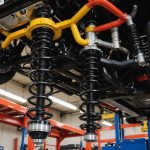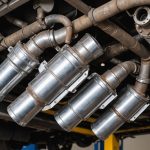Understanding UK Noise Regulations
In the UK, vehicle noise regulations are crucial for maintaining a peaceful environment, particularly in urban settings. Compliance with these regulations helps to reduce noise pollution, benefitting the community and the environment.
Overview of UK Noise Regulations for Vehicles
The UK government sets legal standards for vehicle noise levels, dictating that manufacturers and motorists adhere to specified limits. These legal standards ensure that vehicles do not exceed acceptable noise thresholds, which vary by vehicle type and engine size. It’s pivotal for both manufacturers and owners to stay informed about these numbers to avoid penalties.
Also read : Essential Tips for Preparing Your Vehicle for the UK MOT Emissions Test: A Complete Guide
Importance of Compliance in Urban Settings
Urban areas, with their high population density, face significant noise challenges. Urban noise compliance becomes essential to safeguard the health and well-being of residents. Excessive noise can lead to disturbance, sleep disruption, and other health issues, making it imperative for vehicles operating in these areas to meet the legal standards laid out by the authorities.
Consequences of Exceeding Noise Limits
Failure to adhere to UK vehicle noise regulations can lead to serious repercussions. Authorities may impose fines, and persistent non-compliance might result in stricter penalties or restrictions on vehicle use. Hence, awareness and compliance with these regulations are not only a legal obligation but also a societal responsibility in preserving urban tranquillity.
In the same genre : The Impact of Failing to Renew Your Vehicle Registration in the UK: What You Need to Know
Techniques for Reducing Vehicle Noise
Reducing vehicle noise can significantly enhance driving comfort, and there are diverse noise reduction techniques vehicle owners can explore. One practical approach is modifying the engine to operate more quietly. This might involve installing a silencer or using sound-dampening materials to cover the engine bay, thus decreasing the noise that enters the cabin.
Equally important in managing vehicle noise is the choice of tires. Selecting low-noise tires can make a noticeable difference. These tires are specifically designed with tread patterns that minimize the noise generated by friction with the road surface. Remember, tire pressure and alignment also play roles, as incorrect specs can increase noise levels.
Soundproofing serves as another effective strategy. Materials like acoustic foam or mats can be applied to various parts of the vehicle’s interior—such as doors, floors, and the roof—to enhance cabin silence. These materials absorb and block sound waves, preventing them from penetrating the cabin space. Additionally, window soundproofing films can act as barriers, further limiting noise infiltration.
Together, these vehicle modifications—engine adjustments, tire choices, and soundproofing—can drastically reduce unwanted noise, creating a more peaceful driving experience.
Maintenance Practices for Optimal Noise Control
Maintaining your vehicle routinely is crucial for minimizing unwanted noise and ensuring optimal performance. A key element in managing this is regular inspection and upkeep of the exhaust system. The exhaust system not only plays a pivotal role in controlling emissions but also significantly influences the noise levels of your vehicle. To keep noise in check, it’s imperative to carry out routine checks on the exhaust system components for any signs of wear and tear, such as rust, cracks, or holes. Addressing these issues promptly helps maintain a quieter ride.
Further, identifying potential noise-related issues early can prevent them from developing into larger, more costly problems. Listen for unusual sounds, such as rattling or hissing, which could indicate loose or damaged components. This proactive approach not only aids in noise control but also enhances overall vehicle performance and longevity.
In addition to the exhaust system, other aspects of vehicle maintenance like checking tire pressure, wheel alignment, and engine tune-ups, play a role in noise control. Routine maintenance ensures that your vehicle operates smoothly and efficiently, providing a more enjoyable driving experience.
Remember, frequent routine checks and maintenance practices are essential for effective noise management in vehicles. They safeguard against unnecessary wear and prolong the life of your vehicle, offering peace of mind and a quieter journey on the road.
Community Considerations and Respect
When discussing noise pollution impact, particularly in urban living, understanding the social implications is crucial. Noise from vehicles can disrupt daily life, potentially affecting mental health and causing stress among residents. In these environments, maintaining a respectful community atmosphere is important for ensuring harmonious living.
One significant aspect is the role of community respect in noise compliance. Individuals are encouraged to be mindful of their vehicles’ noise levels, recognizing that excessive noise can infringe upon others’ peace. This responsibility involves adhering to local noise regulations and modifying behavior to fit the community’s needs.
Another essential element is effective communication with neighbors. By engaging with neighbors about noise concerns, residents can collectively address issues and devise strategies for noise reduction. This may include setting agreed-upon quiet hours or promoting the use of quieter transportation alternatives. Such discussions foster a spirit of mutual respect and understanding, ultimately enhancing community well-being.
Overall, a proactive approach to managing noise pollution impact in urban living considers both regulatory compliance and community engagement. By prioritizing community respect, individuals contribute to a quieter, more peaceful environment that benefits everyone. Ensuring that these measures are part of everyday living underscores the collective responsibility of those in shared spaces.
Resources and Further Reading
Staying informed about vehicle noise regulations is crucial for compliance and awareness. In the UK, several key resources can help individuals and organisations navigate these requirements. To start, the government’s official website offers comprehensive documentation on noise regulations and guidelines. These documents provide in-depth information on permissible noise levels and necessary measures to ensure compliance.
When looking for additional guidance, industry-led readings on best practices are invaluable. Publications by authoritative bodies in the field can provide practical approaches to managing and reducing vehicle noise. These resources often encompass a wide range of tactics, from technical modifications to community engagement strategies, making them essential for anyone seeking to mitigate noise issues effectively.
Community resources also play a significant role in addressing noise complaints. Local councils often have dedicated channels through which residents can report concerns, seeking resolution through established protocols. Engaging with these community resources allows individuals to take active roles in reducing noise pollution.
- UK Government’s website: Official regulations and guidelines
- Industry publications: Best practices
- Local council services: Community complaint resolution
By engaging with these resources, individuals and businesses can stay well-informed and compliant with vehicle noise standards.











